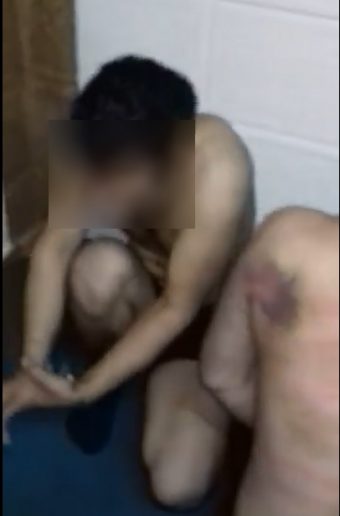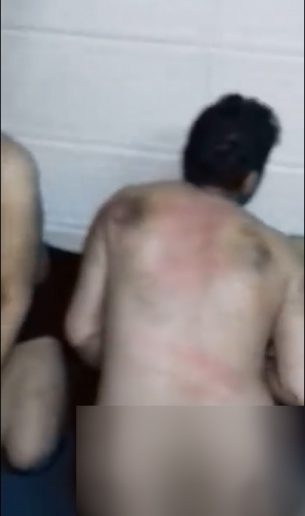In November 2018 and February 2019, 13 civilians belonging to two different families were kidnapped by security services and the militias backing them in Hama province. The kidnapped persons were all released after a separate ransom was paid by each of the families. Following their release, a number of the survivors, 11 to be exact, chose to leave Hama to settle in Idlib province.
The field researchers of Syrians for Truth and Justice/STJ contacted several of the abduction survivors’ relatives, who reported that some of the abductees were subjected to severe torture and deprived of medications, which caused one of them an acute health deterioration.
1. The Kidnapping of Brothers Jihad and Abduljabar al-Saleh:
The two young men, Jihad, 28-year-old, and Abduljabar, 25-year-old, are from the village of al-Tharwat, eastern rural Hama, from which they were displaced after the Syrian regular forces took over the area late in 2017, to settle in an IDP camp in Sarmada city. The brothers, then, decided to undergo legalization of status/sign a reconciliation agreement with the Syrian government to obtain passports and move in Saudi Arabia, where their family is based.
Hamdoun, the brother of the two kidnapped young men, recounted to STJ’s field researcher the details of the incident. He said:
“Early in February 2019, I communicated with a smuggler, one of those who worked in the Qalaat al-Madiq, dubbed Abu Mohammad al-Nairouzi. We agreed that I pay him a million and 200 thousand Syrian Pounds in return for transporting my brothers from Sarmada to Hama city. In mid-February, my brothers head to the Qalaat al-Madiq town and settled in Abu Mohammad al-Nairouzi’s house, who was supposed to secure them a passage means through the Qalaat al-Madiq Crossing. Abu Mohammad did transport them to the delivery point, located between the areas controlled by the regime and those held by the opposition, a short distance from Qalaat al-Madiq. There, they shifted to another car, with three other smugglers. Before their arrival in the city of al-Suqaylabiyah, a white Toyota blocked their way. My brothers were ordered to get off their car and got blindfolded. Abu Mohammad al-Nairouzi contacted me later to tell me that my brothers were kidnapped by a gang affiliated with the National Defense Militia. For three days, there was no news of any sort about my brothers. On February 18, 2019, Abu Mohammad told me that there is a person who can help in releasing my brothers, named Abu Haider, adding that he is well-known and has a reputation of leading a kidnapping gang in the al-Suqaylabiyah.”
Hamdoun added:
“I contacted Abu Haider, who tried to present himself as a neutral side and a mediator between the kidnappers and me. He demanded 10 million Syrian Pounds in return for their release. Negotiations began, and it was decided that I pay 5 million and 200 thousand Syrian Pounds, after the kidnappers sent videos of my brothers being tortured and threatened with murder. I transferred the demanded sum from Saudi Arabia to a person who works in money exchange and transfer in the city of Hama. I asked an old friend of mine, in Qomhane, to receive the money, hand it over to the kidnappers and take my brothers. My friend, S. A., agreed, on the condition that he takes half a million Syrian Pounds in return for the process. On February 28, he went to al-Suqaylabiyah and picked up my brothers from a farm in its surrounding; they were both in a bad health condition and had to be hospitalized.”
STJ’s field researcher contacted a person informed of the incident, who said:
“Abu Mohammad al-Nairouzi is a smuggler and a kidnapping gang leader. His family, for its part, is known for the strong relations it has with the Syrian regular forces and the opposition armed groups alike. He is also involved in several murder and kidnapping cases, but he is protected by the opposition armed groups. In addition to this, Abu Mohammad and Abu Haider are partners in prohibited commercial dealings and trafficking steel from/to the areas held by the regime, given that Abu Haider is heading a group of the National Defense Militia’s personnel in the al-Suqaylabiyah.”


The footage, extracted from a video, features brothers Jihad and Abduljabar al-Saleh being beaten and assaulted by the kidnappers. Photo credit: The family of the abductees.
2. The Kidnapping of 11 Family Members/ Civilians in Hama:
In Hama city, a group of the Air Force Intelligence Service’s personnel, consisting of 10 militants and two officers, a lieutenant and a major, raided the family’s house, kidnapped and held captive its members in a location near the Hama Military Airbase for 72 days. The abductees were released after their son, based in Idlib province, paid 20 million Syrian Pounds as a ransom.
The abductees were three women, four children, an elderly and three men, all civilians. Their house was raided and they were kidnapped by the personnel of the Air Force Intelligence Service on October 17, 2018, and released on November 27, 2018, for no other reason but the anti-regime political activities of one son, based in Idlib since 2012.
The surviving abductee F. A., a woman, recounted to STJ’s field researcher what she had to go through:
“We were arrested in the morning, for a huge force, about ten personnel of the Air Force Security, raided our house. They knocked on the door so strong that we panicked. Then, they invaded the house and arrested all of us; they did not even spare my four children. They led us into a car, where I was shocked at seeing my father, mother and the rest of my siblings, who were in the upper apartment, being arrested too. They took us all to an apartment, a residential basement near the railroad on the outskirts of Hama city. We were ignorant of our charges. The apartment, once we arrived there, was almost empty, containing a few sponge mattresses only. The doors to the rooms were all locked. Then all forms of torture and blackmail started; they deprived my father of his hypertension and diabetes medications. Not only that, they refused to answer our persistent pleas to get him his medicines. Due to this, my father’s blood sugar rose, and we lost him to a state of delirium and memory loss. We were offered food once a day, mostly cooked rice or bulgur. My youngest son suffered dehydration as a result of the food’s poor quality. They beat us with a belt, several times. They insulted and humiliated us.”
The witness could not tell for sure if there were other abductees in the same building, for the security was tight at their apartment’s door and the personnel had all the windows closed with a steel lid that blocked both sunlight and vision. They also closed rooms’ doors, four in number, while they held the family captive in the apartment’s corridor, with only the door to the bathroom left open.
On Thursday, December 27, 2018, the family was released, for their Idlib-based son has sent a remittance to a person in Hama city, following the orders of one of the officers who conducted the kidnapping. He, then, moved the family from Hama city to Qalaat Al Madiq, in rural Hama, from where they headed to Idlib province.
Under a pseudonym, which the eyewitness requested that we use, Abdullah recounted the details of the negotiations he embarked on with the officer. He said:
“On Wednesday morning, October 17, 2018, I received a WhatsApp message from one of our neighbors in the neighborhood, informing me that a group of Air Force Security, massive in number, has raided my family house at dawn, arresting all the people they found there; the children, the women and my old father included. The reasons for the arrest were unknown. I did not believe him in the first time and thought that he was joking. I was at a loss, for many persons, whom I knew at the neighborhood and whom I contacted, repeated the same story. I did not know what to do exactly or the specific reason for their arrest. I was stricken with shock. I always had little to no contact with my family; I stayed away from them so that they are not harmed because of me. On the third day from their arrest, an officer of the Air Force Intelligence Service contacted me, using my mother’s phone. He sent me voice recordings of my parents pleading that I answer all the officer’s demands. However, the first thing he asked me to do was that I give myself in at the nearest regime checkpoint in Hama. I was about to do it, but my friends prevented me decisively, especially that there were no guarantees that my family would be let go if I succumbed to what they wanted me to do. More days passed, my parents’ appeals increased, that I do what they ask. The psychological pressure was unbearable.”
He added:
“My mother told me that my father lost his memory and was getting senile. ‘He lost his mind,’ she said and that they had neither food nor medications. She said that they could not take it anymore. It was at this point, where serious negotiations began, and the officer’s direct demand was the release of 8 Syrian Army officers, of the Alawite sect, who have been held captive by opposition armed groups during the battles of the Abu al-Duhur Military Airbase back in 2015. I told him that the decision to give them in or release them was not mine to make, so they tried to boost the pressure through sending me voice recordings of my mother and my siblings’ children. The situation continued thus for about 12 days, during which I contacted several opposition armed groups to meet the demands of the Air Force Intelligence Service and rescue my family. However, none of them did respond to my petitions.”
Abdullah kept the negotiations with the officer going through WhatsApp messages after he failed to meet the latter’s demand of releasing the Syrian Army’s captives, who the opposition armed groups held. They finally reached a deal, where the family was to be released in return for 20 million Syrian Pounds.
“When they asked for 20 million Syrian pounds, I knew that the suffering is to end soon. I offered my family house for sale. I managed to sell it and secure half of the money. The rest of the [ransom], I managed to collect and borrow from friends and acquaintances. I then transferred it to the address and the person they named in Hama city.”

